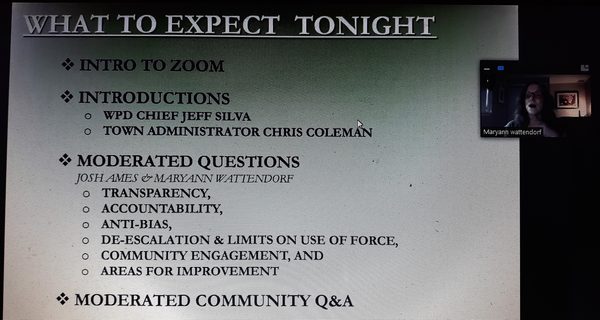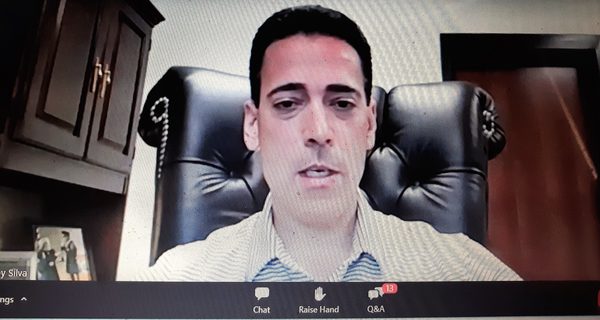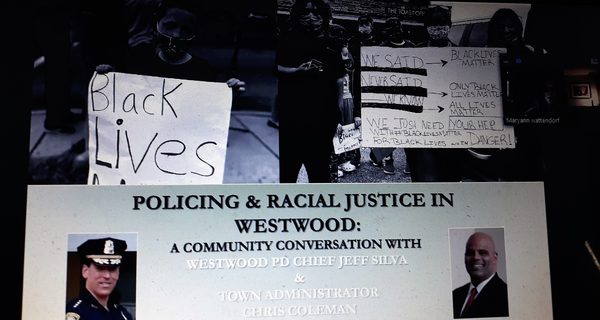An image of the Westwood BLM rally was superimposed over the night’s two main speakers as an introduction page.
By James Kinneen
Hometown Weekly Reporter
With so much discussion about law enforcement in America, it is natural that people want to do what they can to ensure there is just and bias-free policing in their community. But because policies, practices, hiring, training and in the case of states, actual laws, vary so much from community to community, it can be difficult to know if the controversial practices you see debated on cable news networks are happening here in Westwood.
To remedy this knowledge gap, on Thursday night, Neighbors in Action, Inclusive Westwood and the Westwood-Walpole-Dedham League of Women Voters co-sponsored a moderated interview of Westwood Police Chief Jeffrey Silva and Town Administrator Chris Coleman to discuss topics like police transparency, accountability, biases, de-escalation, and limits on use of force.
With around 140 people having registered for the event, Chief Silva was the main speaker, with Coleman occasionally noting the issues from a town perspective. Silva began by talking about how there was already a good base in Westwood when he became chief in 2013, seeing as though many department leadership roles only become available in the wake of a scandal or controversy - not the case in Westwood. However, while the officers on the force were great, he moved the town from a civil-service-based hiring department - which meant he had to hire off a list from the state, and that citizens were only eligible for the exam if they’d lived in Westwood for 12 consecutive months - to an alternative system that gave him more leniency, noting that the old system made it “hard to broaden your access to the public” and hire officers from different backgrounds.

Transparency was a big issue that came up, with Chief Silva outlining his vision of how police forces should interact with the community. Essentially, he argued that having officers interact with the public more often under less hostile circumstance would increase transparency, because more people would know who the officers were, and the officers would thusly be more aware of the townspeople.
“If you’re operating in a reactive police model where the only time you see the police or think to call the police is when there’s a problem, and you do that by calling 911, you already have a lack of transparency because the police department isn’t getting to know the citizenry in their day-to-day life, they’re only getting to interact with them maybe at the worst times in their life when there’s a real crisis. Similarly, the public is meeting that police officer at a time they need to act with expedience.” He later added that you “foster, create and enhance your transparency” when people personally know the officers responding to a call.

Coleman explained that Westwood doesn’t have body cameras, and that getting them would require collective bargaining. But, even if they had them, some transparency issues would arise. For example, while citizens might want to look at the footage, Chief Silva talked about how privacy concerns would make that an issue. He used the example of a person calling the police on a neighbor, then watching to see what their neighbor said about them to the police. This became even more apparent when Westwood’s one school resource officer came up. People wanted to know the demographic breakdown of school resource officer's interactions with students, but outside of the fact that not every interaction is written down, there are all sorts of privacy laws that are especially stringent when talking about minors.
Another issue Silva talked about is that when it comes to something like a racial breakdown of traffic stops, “the data out is only as good as the data in.” Police officers note a person’s race and gender at a traffic stop, but they are only making their best guess. This becomes an issue when police officers are only noting what race they think a person is, because it would obviously be problematic - or at least appear very problematic - if an officer asked someone what race they were, during a stop. Silva said he wished the RMV would have their own database, so officers wouldn’t have to guess, and the data could be much clearer.
The use of force was another huge issue that was asked about. Silva was quick to note that while people hear “force” and assume, at minimum, this means the police grabbing and handcuffing a guy, technically, just showing up in a marked patrol car to deal with a noise complaint is officially considered a “use of force.” Westwood moved from a “use of force continuum” to a “use of force model,” noting that “continuum” seems to imply a constant escalation. But in terms of the use of deadly force, Silva noted that Westwood has trained in use of force simulations with high tech paintball guns and almost video-game-like simulations.
Chief Silva also talked about how Westwood has a duty to intervene policy, as well as a requirement for Westwood police officers to report anything they think is an improper use of force, regardless of the rank of the officer. Silva also brought tasers to Westwood, which he believes both allow for greater transparency (taser information - like how often it was shot - is downloaded into the cloud) and is consistent, regardless of how big, strong, or fast an officer is. More controversial pieces of equipment are surplus military supplies. While Westwood hasn’t taken any and has no plans to, Silva said he would take an armored vehicle if they gave him one, noting the difference between a vehicle being “armored” and being “armed.”
As for possible biases in policing, Chief Silva noted that Massachusetts has bias training in their police academies, and that unlike in other states, all Massachusetts police have to graduate from an academy. But the main idea Silva consistently came back to was the idea of police being active in the community. Silva pointed out that the old Westwood cruisers had “call 911” on them, but that was replaced with the town motto, “committed to service,” to reflect this move away from purely reactive policing.
Silva was big on the idea that a system in which an anonymous police officer meets a town member he doesn’t know only after 911 is called is not the kind of policing he wants. Instead, Silva wants his officers to be active members of the community, and said that he constantly tells his officers there is “no call too small.” He talked about how his sergeants go through the police logs every shift, and how he will personally call people that were affected, which tends to surprise them. To that end, Silva noted that while people think of all the dangerous situations cops deal with, his officers “have changed more lightbulbs than some electricians with flourishing practices.”
While there were many questions from the community - ranging from ones about replacing the school resource officer with a social worker (Chief Silva said he’d rather it not be one or the other due to something like an active shooter in class, but recognized budget issues) to what exactly it means that Westwood is getting accredited by MPAC - one question that went unanswered was most interesting.
Dave Atkins wrote in the Zoom question-and-answer: “So much of what the Chief describes rests on the assumption that we WANT police to be engaged in our lives. While respecting the hard work they do, how can we have a discussion about whether that vision is something we really want?”
Indeed, for many people “no call too small” isn’t the best police slogan, it’s precisely the problem. They point to how many of the national newsworthy incidents began with lesser crimes or alleged suspicious activity, and very much fear the idea of a more active police presence in the community regardless of intent. They don’t want to get to know the police personally; they don’t want the police in their neighborhoods at all. For many, more police on the streets just means more over-policing.
Still, whether the harshest critic or the most ardent supporter, it is always better to know more about how the police in your community hire, train and operate. On Thursday, Westwood residents were given the opportunity to obtain that knowledge.

























